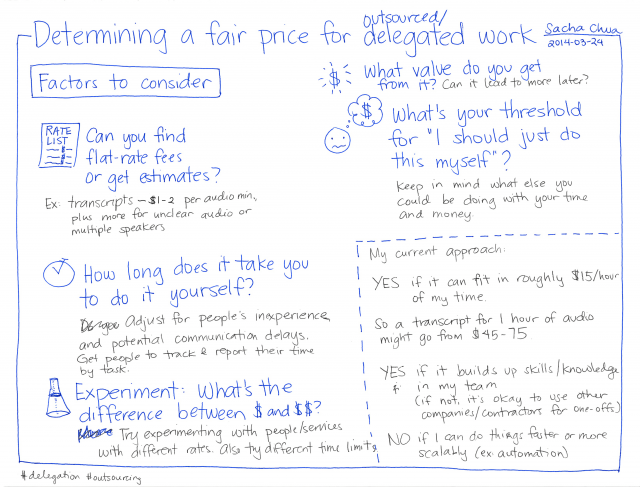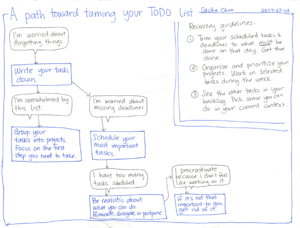Figuring out a fair price for outsourcing work
Posted: - Modified: | delegationHow can you figure out a fair budget for delegating work? If you set your budget too low, you might get frustrated by lack of response or by the kinds of results you get. If you set your budget too high, you might waste effort and talent. I can't give you a price sheet. Besides, your needs will evolve over time. However, I can share some of the things I've been learning about budgeting for outsourcing or checking if people's times are reasonable.
If you're working with hourly assistance, you can ask people to track their times for specific tasks so that you can get a sense of how much something costs. You can also give a time limit and ask them to send you what they have at the end of that time. This will help you get a sense of their speed and the cost of the task. If you're working with fixed-cost services, you can translate things back into hourly estimates and compare that with your own experience. Pick one system of measurement so that you can compare your chioces.

Instead of trying to nail down a single price, try to figure out a range that you're comfortable with. You can start by looking for flat-rate fees from companies or people who post fixed prices online. For example, Transcript Diva lists transcript rates and timelines for some of their competitors as well. For general tasks, services like Fiverr and Fancy Hands help establish a range of $5-15 for common tasks.
Another way to establish a limit for what you're willing to spend is to consider how long it takes you to do things yourself, and what else you would do with that time. Adjust based on people's experience. Beginners will take longer to do things than you will, while experienced people may do this just as fast as you can. Specialists who have invested in tools or training may do things even faster. Sometimes it makes sense to delegate a task to someone who isn't the optimal choice in terms of speed or cost, if they're more integrated with the way you work or if you want to help them grow. (Sketch:
; blog post)Then experiment. Try delegating a small task to a lower-cost service to see if that will meet your needs. Try delegating a similar task to a premium service to see if it's worth the price. Try a mid-range service.
Think about the value you can get from the different types of results you have. If a service is expensive but it leads to a lot more income, it may be worth it.
Think of when you'd prefer to do things yourself, too. For example, even though it's easy to find inexpensive data entry assistance, I prefer to automate straightforward tasks because I get to learn more about automation along the way.
As you delegate, think about what was worth it, and adjust accordingly. Make your experiments a little bit bigger as you get used to the idea. Find your sweet spot, and then keep experimenting. Good luck!

